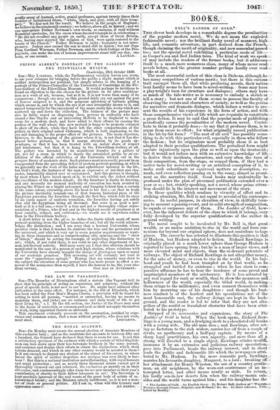PRINCE ALBERT'S' PORTRAIT" IN THE GALLERY OF THE FITZ WILLIA
. XIISEITAL
Cambridge, 28th °delve .1850: Sin.—May I venture,. while. the Parliamentary vacation leaves you room, to use your columns for bringing before the public a slight matter which is neither. metropolitan nor political, but simply relates to the hanging of a portrait of. the „Prince-Chancellor of, the University of Cambridge in the of the Fitzwilliam Museum. It would perhaps be invidious to found.an objection to the site chosen for the .picture on its utter. worthless- ness as a work Otart, because,. had as it is, it is not worse than many of its companions ; though one may on this ground fairly cry out against the post. of honour assigned to it, and the .gorgeous splendour of barbaric gilding. which encase it, and by which the eye is at once irresistibly drawn to it, and ruined temporarily for the enjoyment of the many really fine works which are scattered up and down the collection. The badness of the picture may. • also.. be fairly. urged as disgracing those persons in authority who have caused a fine .Snyder and an interesting Holbein to be displaced to make . room, for a modern. daub, and have added to their offence by causing the. portion of the wall :where this new portrait. is hung to be properly coloured. to show off its effect, while they have left the other compartments of the gallery in their original naked whiteness, which is both unpleasing.to the eye. and damaging. to the proper effect of the pictures. The main objection, however, to the. hanging of the picture where it is, is not. that it has dis-. placed better pictures, or that it usurps attention by its gaudy ap- pendages, or that it has been. treated with an unfair share of respect and tenderness; but that it is hung in the .Fitzwilliam Gallery. at alL. The gallery was intended by its munificent founder . for a gallery of art, not for a- room in which to dazzle. the astonished .publio . by an ex- hibition of the official celebrities. .of the . University tricked out in the gewgaw finery of academic state. Such .picturesmust necessarilypresent inan exaggerated form the prevailing defect of modern portrait-painting, in which-. we generally see the work of the tailor.and upholsterer imitated to thelife, but God's work, the features of the man as. expressive of intellect and.clus, rector, lamentablslurred over or caricatured. And this. picture is thought,„ by most whom I ye. heard speak of to exhibit only the defect without the:excellence of the modern school; for the furniture is faulty in drawing, and any necessity . for manual dexterity of execution has been avoided by placing the Prince on a. bright red carpet and hanging behind him,a. curtain of the same colour, extending above his head to his feet ;—so that in truth the picture inevitably. reminds one. of that famous historical piece. of the Egyptians pursuing the Israelites :through the Red Sea, which told its story by six yards square of uniform vermilion, the Israelites having got safely over , and the Egyptians being all .drowneck But. were . it as good e por- trait wit is a bad -one,—were it a true and not a thoroughly vulgar. _repre- sentation of a Prince, who if not cast in the highest mould of greatness is at least amiable, refined, and cultivated,—we would see it anywhere rather than in the Fitzwilliam Gallery. A short letter is not the place to define the limits which mark off mere portrait- ainting;from the higher branches of art ;but all the world acknow- ledges the. distinction ; and I am sorry that, a learned University, whose peenliar claim is that it teaches its students the true and the permanent and,: the universal, and which is very apt to scorn popular acquirements as want- ing in these characters and-as comprehending only opinions and,the " show of things2" should be setting the example of neglecting this distinction in art; which, if not valid there,is not valid in any other department of hu- man intellectual activity. Still more sorry am I that this oblivion should be manifested in the ease. of a person of such 'high station, whose relations with the University have already brought the charge .of jtunkeyism upon so many of our academic grandees. This crowning act will certainly not tend to erase the " opprobrious epitaph." Hoping that my remarks- may draw to the subject the attention of some person who has more power to effect a re- moval of the annoyance than myself,. I have the honour to be, Sir, your. obe-


























 Previous page
Previous page